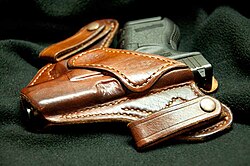Concealed weapon
A concealed weapon is a dangerous weapon that is hidden from view.[1] It can also be a dangerous weapon under a person's control that is not readily visible. The term is most often applied to handguns. A dangerous weapon is any weapon that can inflict death or serious injury on another person. Various jurisdictions define what a dangerous weapon is. Carrying a concealed weapon is illegal as defined by laws of many states,[2] provinces, and countries. The usual exceptions are law enforcement officers and members of the military who carry weapons as part of their jobs.[3] Many jurisdictions may issue concealed weapons permits (also called concealed carry permits) giving individuals permission to carry a concealed weapon within their jurisdiction.[4]
Concealed weapon laws
Carrying a concealed weapon (CCW) is the practice of carrying a handgun out of sight, hidden somewhere on a person's body. CCW is regulated by the states in the US. The laws vary, sometimes considerably, from state to state.[5] As of 2015, most states grant licenses to carry handguns on a "Shall-Issue" basis to qualified applicants. Shall-Issue means the jurisdiction issuing the license must issue the license to anyone who is not otherwise prevented from owning a firearm. "May-Issue" allows the jurisdiction to decide on a case-by-case basis who may be issued a license. A few states are may-issue states, while seven states allow the carrying of firearms in a concealed manner without a permit (called Constitutional-carry).
Global gun laws
Gun laws vary considerably around the world. The larger majority of countries heavily restrict or do not allow citizens to carry firearms.
United States and Canada
Penalties for carrying a concealed weapon in the US without a permit can vary by jurisdiction. In some cases it is a misdemeanor but more often it is considered a felony.[6] In Canada CCW is illegal but permitted under rare circumstances.[7]
Mexico
In Mexico civilians cannot own guns since it has been illegal since 1968.[8] However, most Mexicans own guns, even fully automatic weapons.[8] In South Africa there are about 6 million licensed handgun owners.[9] There is also a very large backlog of those applying for a license.[9] Illegal guns can be easily bought off the streets. About 2,000 guns are stolen per month from licensed owners making it the largest source of illegal guns.[9]
Concealed Weapon Media
A New York Times study reported how outcomes of active shooter attacks varied with actions of the attacker, the police (42% of total incidents), and bystanders (including a "good guy with a gun" outcome in 5.1% of total incidents).
References
- ↑ "Concealed Weapons Laws & Legal Definition". US Legal.com. Retrieved 9 January 2015.
- ↑ Carl Brown, 'Nunchucks and Throwing Stars in Your State?', Black Belt, Vo. 32, No. 8 (August 1994), pp. 80–82, 112, 144
- ↑ John Scheb; John Scheb, II, Criminal Law (Belmont, CA: Wadsworth, 2012), p. 357
- ↑ Alice Adams, Trucking Rules and Regulations: A Reference Guide to Transportation Industry (Clifton Park, NY ; London: Thomson Delmar Learning, 2005), p. 70
- ↑ "Gun laws in the US: seven things you need to know about the data". The Guardian. Retrieved 18 January 2016.
- ↑ Mark Theoharis. "Carrying a Concealed Weapon". NOLO. Retrieved 18 January 2016.
- ↑ "Justice Laws Website". Canada.gov. Retrieved 18 January 2016.
- ↑ 8.0 8.1 Ralph Weller. "Counting Mexico's Guns". GunNewsDaily.com. Retrieved 18 January 2016.
- ↑ 9.0 9.1 9.2 Ollie John (15 February 2013). "Oscar Pistorius Shooting: How Strict Are South Africa's Gun Laws?". Time. Retrieved 18 January 2016.


